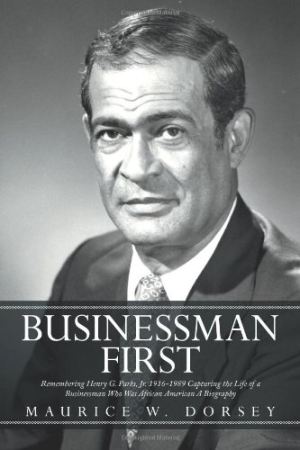Businessman First
Remembering Henry G. Parks, Jr. 1916-1989 Capturing the Life of a Businessman Who Was African American
This hardworking, behind-the-scenes businessman is a voice of the civil rights movement that deserves to be heard.
Shedding light on an unknown pioneer of African American civil equality, this important biography details the life of an impressive subject. In Businessman First, Maurice W. Dorsey does justice to Henry G. Parks, Jr., an African American salesman born in 1916.
Through his dogged work ethic, shrewd business sense, and sheer determination, Parks built a hugely successful sausage company that never failed in his lifetime. But even as he leveraged his business victories into political and social action, Parks remained a background figure in the struggle for African American civil rights.
Though the book does not go into them in much detail, it is impossible not to be struck by the sacrifices Parks made. He ran his company’s public relations machine so skillfully that most of his customers never realized he was black, a fact that could have critically wounded his business. Parks also made other sacrifices: though he was unapologetic about his love for men, Parks never identified himself openly as gay or bisexual during his lifetime. Instead, Dorsey details Parks’s two companionate marriages and his silent agony over the death of the man he loved. The professional feats Parks achieved would have been remarkable under any circumstances, but it is his nearly superhuman personal resilience that makes him a truly impressive figure.
The author himself knew Parks very well, a status that many readers may envy. The book reflects Dorsey’s thorough interviews of his friend, and there are photographs and other material to illustrate the text. Unfortunately, the literary treatment of Parks’s life is direct and undramatic, and reads much like a list or résumé. Multiple consecutive sentences begin with “he,” for example, and go on to simply relate one of Parks’s accomplishments without much context or elaboration. This can make Businessman First a bit of a slog, but the subject matter consistently remains engaging enough to shine through the awkward writing style.
The nonchronological, subject-based structure of this book is slightly more problematic, contributing to some difficulty in placing major events in Parks’s life within the context of the civil rights era. A linear structure could enhance the mainstream appeal of this volume immensely. That said, Dorsey does a fine job beginning this story, and his research is invaluable. With hope, the record of Henry Parks’s quietly heroic life will not end here but continue to be explored.
In the fading wake of the civil rights movement, only the monumental characters, like Martin Luther King and Malcolm X, tend to be visible, towering like skyscrapers over the horizon. Hardworking people acting behind the scenes can be lost to view and easily forgotten, except by their close friends and family. Parks is one of those civil rights beacons whose story deserves to be told.
Reviewed by
Anna Call
Disclosure: This article is not an endorsement, but a review. The publisher of this book provided free copies of the book and paid a small fee to have their book reviewed by a professional reviewer. Foreword Reviews and Clarion Reviews make no guarantee that the publisher will receive a positive review. Foreword Magazine, Inc. is disclosing this in accordance with the Federal Trade Commission’s 16 CFR, Part 255.

